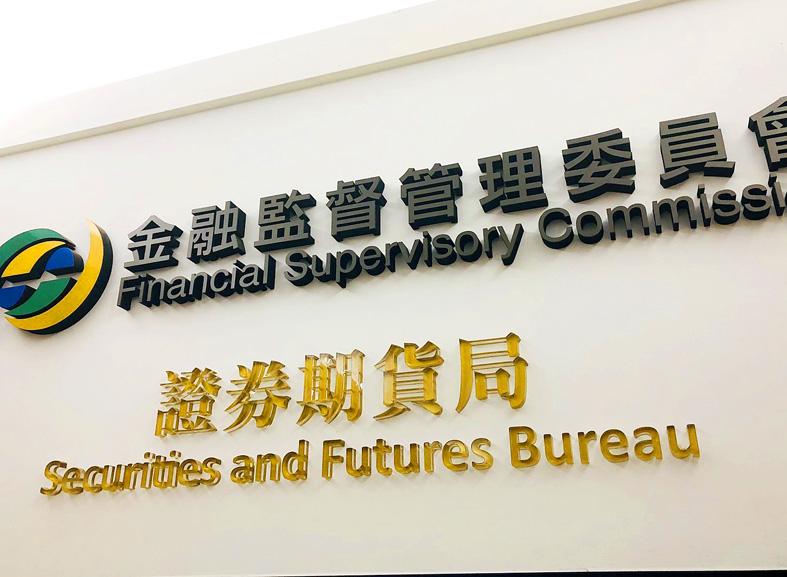Tightened rules on removing executives at publicly traded companies are to come into effect next month, barring board directors from proposing such dismissals through extraordinary motions, the Financial Supervisory Commission said yesterday.
Companies contravening the new rules are to face fines from NT$240,000 to NT$4.8 million (US$8,019 to US$160,385), the commission said, adding that the removal of chairpersons under illegal circumstances would not be recognized by the Minister of Economic Affairs (MOEA).
Currently, board directors can make notification of such motions seven days before a board meeting.

Photo: Kelson Wang, Taipei Times
As removing or electing a company’s head has significant effects, such a motion should not arrive without enough time to be discussed by board members, the Securities and Futures Bureau told an online news conference.
The tightened rules also apply to extraordinary board meetings, and the commission is to have the authority to specify under what conditions board directors can convene such meetings, the bureau said.
“Several companies suggested clearer conditions for holding extraordinary board meetings, as current regulations only apply to meetings in the case of emergency,” bureau Chief Secretary Kao Ching-ping (高晶萍) said.
However, defining what scenarios can be viewed as emergencies is complicated, Kao added.
The commission is planning to provide sample scenarios to companies as references, such as an emergency situation arriving when shareholders fail to elect a new head at an annual general meeting, she said.
In November last year, Solar Applied Materials Technology Corp (光洋科) reshuffled management, with Ma Chien-yung (馬堅勇) being removed as chairman by activist directors through an extraordinary motion.
The removal was dismissed by the MOEA in December, saying the case was not an emergency.

NEW IDENTITY: Known for its software, India has expanded into hardware, with its semiconductor industry growing from US$38bn in 2023 to US$45bn to US$50bn India on Saturday inaugurated its first semiconductor assembly and test facility, a milestone in the government’s push to reduce dependence on foreign chipmakers and stake a claim in a sector dominated by China. Indian Prime Minister Narendra Modi opened US firm Micron Technology Inc’s semiconductor assembly, test and packaging unit in his home state of Gujarat, hailing the “dawn of a new era” for India’s technology ambitions. “When young Indians look back in the future, they will see this decade as the turning point in our tech future,” Modi told the event, which was broadcast on his YouTube channel. The plant would convert

‘SEISMIC SHIFT’: The researcher forecast there would be about 1.1 billion mobile shipments this year, down from 1.26 billion the prior year and erasing years of gains The global smartphone market is expected to contract 12.9 percent this year due to the unprecedented memorychip shortage, marking “a crisis like no other,” researcher International Data Corp (IDC) said. The new forecast, a dramatic revision down from earlier estimates, gives the latest accounting of the ongoing memory crunch that is affecting every corner of the electronics industry. The demand for advanced memory to power artificial intelligence (AI) tasks has drained global supply until well into next year and jeopardizes the business model of many smartphone makers. IDC forecast about 1.1 billion mobile shipments this year, down from 1.26 billion the prior

People stand in a Pokemon store in Tokyo on Thursday. One of the world highest-grossing franchises is celebrated its 30th anniversary yesterday.

Zimbabwe’s ban on raw lithium exports is forcing Chinese miners to rethink their strategy, speeding up plans to process the metal locally instead of shipping it to China’s vast rechargeable battery industry. The country is Africa’s largest lithium producer and has one of the world’s largest reserves, according to the US Geological Survey (USGS). Zimbabwe already banned the export of lithium ore in 2022 and last year announced it would halt exports of lithium concentrates from January next year. However, on Wednesday it imposed the ban with immediate effect, leaving unclear what the lithium mining sector would do in the